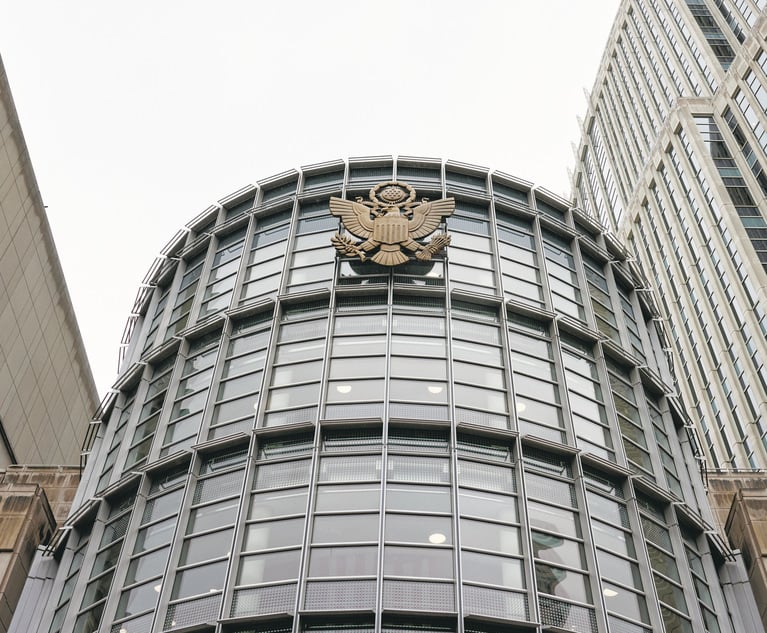Group's Lawsuit Challenging 'Unfair' NYC Property Tax System Survives Motion to Dismiss
New York state and New York City can't shake a legal challenge from a group of property owners and renters who say the city's property tax system gives wealthy residents a break on their taxes while placing an unfair burden on those of modest means.
September 26, 2018 at 06:31 PM
5 minute read
 Gerald Lebovits.
Gerald Lebovits.
New York state and New York City can't shake a legal challenge from a group of property owners and renters who say the city's property tax system gives wealthy residents a break on their taxes while placing an unfair burden on those of modest means.
Acting Manhattan Supreme Court Justice Gerald Lebovits denied the city and state governments' motion to dismiss, finding the plaintiffs, united in a group called Tax Equity Now NY, have standing to bring the suit and preserved due process claims against the two governments that the city's tax burdens have no relationship to real market values.
The group wants Lebovits to declare the city's property tax scheme and the state laws that govern it unconstitutional.
Lebovits did let the state off the hook on claims that it violated the Fair Housing Act, the equal protection clause and state property tax laws.
But the New York City government had no such luck. The plaintiffs are being allowed to move forward with all 16 of their claims against the city, including that its property tax system violates the FHA because it disproportionately affects majority-minority neighborhoods and that it perpetuates racial discrimination in housing.
In their suit, filed in 2017, the plaintiffs argue that the property tax system tends to undervalue condominiums and cooperatives compared with rental apartments, thus causing more financial pain for renters in the form of higher property taxes for landlords that are passed along as higher rent.
Despite New York City's diversity, the plaintiffs argue, racial segregation in the city is pervasive. According to city data contained in the lawsuit, no one racial group makes up more than a third of the city's population, yet almost half of the city's neighborhoods are dominated by a single racial group.
And there is evidence of tax burdens falling harder on predominantly black and brown neighborhoods, the plaintiffs allege. Among the alleged “absurdities” found under the tax system include a $1,300 in property tax-bill for a $500,000 house in the relatively affluent and majority-white Park Slope section of Brooklyn while the owner of a house of the same value in Brooklyn's Canarsie neighborhood, where the population is about one-quarter white, would pay $5,460.
Tax Equity Now is represented by a team from Latham & Watkins that includes former Court of Appeals Chief Judge Jonathan Lippman, who is now of counsel to the firm, and partners James Brandt, Richard Bress and Michael Bern.
“We filed our suit because the current system unfairly burdens homeowners in lower-income and minority communities, primarily in the outer boroughs,” said Martha Stark, director of policy for Tax Equity Now, in a news release. “As the result of today's ruling, thousands of New York property owners will have their day in court.”
Assistant Corporation Counsels Joshua Sivin and Andrea Chan are appearing for the city. A Law Department spokesman said the office is reviewing Lebovits' decision.
“We continue to believe this is a topic best addressed by the Legislature rather than the courts,” said Law Department spokesman Nicholas Paolucci. “We've established a commission that is actively considering the issues raised in this action.”
The New York Attorney General's Office declined to comment.
City leaders announced the creation of the commission Paolucci referred to, the Advisory Commission on Property Tax Reform, in May.
The commission has held two public meetings thus far and is planning five public hearings in the coming weeks, with the first set to be held on Thursday night at Public School 58 on Staten Island.
Vicki Been, a New York University School of Law professor who co-chairs the commission, said the commission is concerned about the issues raised in Tax Equity Now's lawsuit, such as “growth caps” that depress tax assessments as market rates increase and disparities between assessments of “Class 2” properties, which generally covers apartments, co-ops and condos.
“Certainly we will be considering those,” she said.
But Lippman said the Tax Equity Now suit has done more so far to raise awareness about the city's property tax system than the statements of elected officials, and that the case is moving on toward the discovery phase and on a separate track from the work of the commission.
“Commissions come and go and nothing happens,” Lippman said. “That has been the history of New York and we certainly do not intend for that to continue.”
Read more:
NYC, NY State Spar With Renters and Owners Over Property Tax Scheme
NY's Latest Legislative Session: What Passed, What Didn't, What's Next?
The Tax Act and Real Estate—The Limitation on Deductibility of Interest
This content has been archived. It is available through our partners, LexisNexis® and Bloomberg Law.
To view this content, please continue to their sites.
Not a Lexis Subscriber?
Subscribe Now
Not a Bloomberg Law Subscriber?
Subscribe Now
NOT FOR REPRINT
© 2025 ALM Global, LLC, All Rights Reserved. Request academic re-use from www.copyright.com. All other uses, submit a request to [email protected]. For more information visit Asset & Logo Licensing.
You Might Like
View All
Disbarred NY Atty Receives 54-Month Prison Sentence After $3M Embezzlement
3 minute read
Unit Owners Sued Board for Failure To Maintain Adequate Fire Insurance: This Week in Scott Mollen’s Realty Law Digest


Trending Stories
- 1With AI, What Changes Can Midsize Firms Expect?
- 2Saul Ewing Loses Two Partners to Fox Rothschild, Marking Four Fla. Partner Exits in Last 13 Months
- 3Eagles or Chiefs? At These Law Firms, Super Bowl Sunday Gets Complicated
- 4Former NY City Hall Official Tied to Adams Corruption Probe to Plead Guilty
- 5Wilmer, White & Case, Crowell Among the Latest to Add DC Lateral Partners
Who Got The Work
J. Brugh Lower of Gibbons has entered an appearance for industrial equipment supplier Devco Corporation in a pending trademark infringement lawsuit. The suit, accusing the defendant of selling knock-off Graco products, was filed Dec. 18 in New Jersey District Court by Rivkin Radler on behalf of Graco Inc. and Graco Minnesota. The case, assigned to U.S. District Judge Zahid N. Quraishi, is 3:24-cv-11294, Graco Inc. et al v. Devco Corporation.
Who Got The Work
Rebecca Maller-Stein and Kent A. Yalowitz of Arnold & Porter Kaye Scholer have entered their appearances for Hanaco Venture Capital and its executives, Lior Prosor and David Frankel, in a pending securities lawsuit. The action, filed on Dec. 24 in New York Southern District Court by Zell, Aron & Co. on behalf of Goldeneye Advisors, accuses the defendants of negligently and fraudulently managing the plaintiff's $1 million investment. The case, assigned to U.S. District Judge Vernon S. Broderick, is 1:24-cv-09918, Goldeneye Advisors, LLC v. Hanaco Venture Capital, Ltd. et al.
Who Got The Work
Attorneys from A&O Shearman has stepped in as defense counsel for Toronto-Dominion Bank and other defendants in a pending securities class action. The suit, filed Dec. 11 in New York Southern District Court by Bleichmar Fonti & Auld, accuses the defendants of concealing the bank's 'pervasive' deficiencies in regards to its compliance with the Bank Secrecy Act and the quality of its anti-money laundering controls. The case, assigned to U.S. District Judge Arun Subramanian, is 1:24-cv-09445, Gonzalez v. The Toronto-Dominion Bank et al.
Who Got The Work
Crown Castle International, a Pennsylvania company providing shared communications infrastructure, has turned to Luke D. Wolf of Gordon Rees Scully Mansukhani to fend off a pending breach-of-contract lawsuit. The court action, filed Nov. 25 in Michigan Eastern District Court by Hooper Hathaway PC on behalf of The Town Residences LLC, accuses Crown Castle of failing to transfer approximately $30,000 in utility payments from T-Mobile in breach of a roof-top lease and assignment agreement. The case, assigned to U.S. District Judge Susan K. Declercq, is 2:24-cv-13131, The Town Residences LLC v. T-Mobile US, Inc. et al.
Who Got The Work
Wilfred P. Coronato and Daniel M. Schwartz of McCarter & English have stepped in as defense counsel to Electrolux Home Products Inc. in a pending product liability lawsuit. The court action, filed Nov. 26 in New York Eastern District Court by Poulos Lopiccolo PC and Nagel Rice LLP on behalf of David Stern, alleges that the defendant's refrigerators’ drawers and shelving repeatedly break and fall apart within months after purchase. The case, assigned to U.S. District Judge Joan M. Azrack, is 2:24-cv-08204, Stern v. Electrolux Home Products, Inc.
Featured Firms
Law Offices of Gary Martin Hays & Associates, P.C.
(470) 294-1674
Law Offices of Mark E. Salomone
(857) 444-6468
Smith & Hassler
(713) 739-1250






